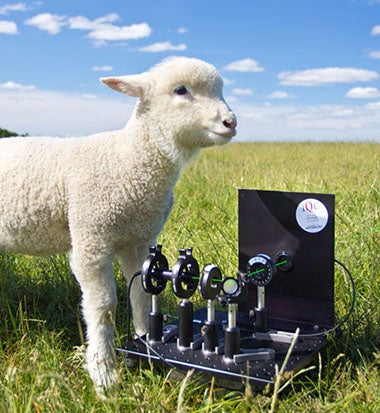
Will quantum cryptography hold the key to data security?
Waterloo hosts conference exploring new research on the next generation of data security.

Waterloo hosts conference exploring new research on the next generation of data security.
By Jodi Szimanski Institute for Quantum ComputingThe University of Waterloo's Institute for Quantum Computing will host the third annual QCrypt conference August 5-9. More than 170 researchers will discuss research progress in the field of quantum cryptography, an important element in future cyber security.

A sheep is the official mascot for QCrypt conferences - a nod to Dolly (the first successfully cloned animal) and the no-cloning theorem in quantum mechanics.
Today’s cryptographic schemes keep everyday transactions on the internet secure. In the not-so-distant future, quantum computers will be able to break these schemes.
But the same technology that can break today’s cryptography can add unbreakable key exchange and other tools to tomorrow’s cyber-security arsenal.
“We need to transition the current cryptographic toolbox to one that will protect against emerging quantum technologies, one that is quantum-safe.” said Michele Mosca, deputy director, Institute for Quantum Computing. “Quantum cryptography will be a critical part of protecting against the cyber attacks of the future.”
The conference includes invited talks, lectures and tutorials by researchers like Nobel Laureate and IQC alumnus Sir Anthony Leggett; and Scott Aaronson of MIT, author of the blog, Shtetl-Optimized, which is widely followed in the scientific community. The industry showcase will include research groups and companies from around the world displaying their products and prototypes such as:
The public is invited to a lecture during the conference: Quantum Computing and the Entanglement Frontier, Tuesday, August 6 at 7:00 pm. It’s by John Preskill, the Richard P. Feynman Professor of Theoretical Physics at Caltech.
Preskill is one of the pioneers of modern quantum information research.

Read more
New tool estimates real-world costs of quantum computing so businesses can become quantum ready

Read more
The awarded proposal seeks to understand and mitigate the loss of quantum information

Read more
Scientists recreate properties of light in neutral fundamental particles called neutrons
The University of Waterloo acknowledges that much of our work takes place on the traditional territory of the Neutral, Anishinaabeg, and Haudenosaunee peoples. Our main campus is situated on the Haldimand Tract, the land granted to the Six Nations that includes six miles on each side of the Grand River. Our active work toward reconciliation takes place across our campuses through research, learning, teaching, and community building, and is co-ordinated within the Office of Indigenous Relations.